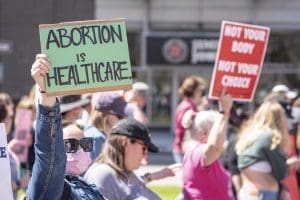Michigan activist: Abortions happen 'whether they're legal or not'
Nearly one in six Michigan women between the ages of 15 and 44 had an induced abortion in 2020.

A leaked draft opinion obtained by Politico last week suggesting the U.S. Supreme Court intends to vote to reverse the landmark Roe v. Wade ruling has inspired outrage across the country, as many fear a future without access to safe abortions.
The ruling in Roe v. Wade in 1973 affirmed a federal right to abortion.
Over 2.2 million women in Michigan could lose access to abortion services if the landmark ruling falls, according to the Planned Parenthood Federation of America. Michigan is one of 13 states that have so-called “trigger laws” on the books that would automatically take effect and ban abortion if Roe were overturned. Under Michigan’s law, abortion, even in cases of rape or incest, would become a felony with a penalty of up to four years in prison.
Nearly one in six Michigan women between the ages of 15 and 44 had an induced abortion in 2020, according to the Michigan Department of Health and Human Services.
Last month, Planned Parenthood of Michigan filed a lawsuit to prevent the 1931 law from being enforced, following a suit filed by Michigan Gov. Gretchen Whitmer with the same goal.
Detroit reproductive justice worker Tameka Jackson-Dyer reflected that making abortions illegal does not stop them but rather makes them “more dangerous.”
“Sometimes my clients need abortion,” said Jackson-Dyer, who has more than 20 years of clinical and lived experience in maternal and infant health. “And I know that if they aren’t able to get it, some of them are desperate enough to do it themselves, which we know leads to higher risk of death.”
Jackson-Dyer says she has assisted many Michigan families in finding access to prenatal care, maternity aftercare, and abortions.
“The people who claim to be pro-life, I’m not sure whose lives they’re ‘pro’ for but it’s definitely not the folks that I serve,” Jackson-Dyer said. “Having had abortions in my lifetime, I know how important it is to receive it in a timely manner [with] respectful care in a safe place because they happen, whether they’re legal or not.”
Now a mother of three, Jackson-Dyer reflected on her first abortion experience, when she was living in poverty and experiencing postpartum depression. She was already struggling to make ends meet and pay for her first child’s day care. The medication she was taking affected her birth control, leading to an unplanned pregnancy.
A newly single mother after separating from her abusive ex-husband, Jackson-Dyer chose to have an abortion.
Her second abortion, Jackson-Dyer said, was necessary to save her life from an ectopic pregnancy with no chance of coming to term.
“[Those pushing abortion bans] want to control the trajectory of my life because whether or not I have children, and when, impacts everything in my life, especially as a Black woman,” she said. “It’s absolutely insane to me that we’re even still having to argue about it, in a country that has the highest maternal mortality rate and infant mortality rate of any industrialized nation, and no maternity leave or universal health care.”
In 2019, the United States had the fifth-highest maternal mortality rate worldwide and the highest among developed countries, according to Statistica. A 2020 analysis by the Commonwealth Fund found that the 2018 U.S. maternal mortality rate of 17.4 deaths for every 100,000 live births was more than double the rates of a majority of other developed countries studied.
Black women are also three times more likely to die from a pregnancy-related cause than white women, according to the Centers for Disease Control and Prevention. Factors like lack of quality health care, structural racism, and implicit bias can cause such disparities. Social determinants of health prevent many people from racial and ethnic minority groups from having fair opportunities for economic, physical, and emotional health.
Loren Khogali, the executive director of the American Civil Liberties Union of Michigan, said the overturning of Roe would be catastrophic for Michigan residents.
“From a health care perspective, from an equity perspective and a personal privacy perspective, this is the most intimate decision that people make about their own bodies and their own reproductive health care, when and if to have children,” Khogali said. “To strip people of their personal autonomy would be devastating.”
Janet McAllister, a 19-year old Detroit resident, said she had always been against abortions until she needed one herself. She has had two abortions.
“I knew what I had to do,” McAllister said. “Because if I would have went ahead and proceeded with having a child, and that puts a 19-year-old who’s still a child herself in the position where she has to be a parent of a kid.”
McAllister said it was hard to find a job and secure financial stability for herself, let alone for a child.
“I really do feel if I would have had that baby that I really would have been struggling right now, if abortions weren’t available to me,” McAllister said. “‘That’s why it’s important that we should have this choice, because it’s our bodies — nobody should be able to take that away from us.”
In January, the organization Reproductive Freedom for All began a ballot petition drive in an effort to codify abortion protections in the Michigan Constitution. The proposal, carried out in coalition with the ACLU of Michigan, Planned Parenthood of Michigan, and the organization Michigan Voices, requires 425,000 signatures by July 11 to qualify for the November ballot.
“This is the moment for people to mobilize and come together,” the ACLU’s Khogali said. “This is an incredibly dark moment for reproductive rights and abortion rights across the country. We need to get those signatures so we can get on the ballot in November and put it to the people to decide to protect abortion in Michigan.”
Published with permission of The American Independent Foundation.
Recommended

New NC GOP chair flirts with bogus stolen election conspiracies
Simmons predecessor was a staunch 2020 election denier
By Jesse Valentine - April 19, 2024
Texas activists pushed abortion restrictions in NM cities and counties, records show
Emails reveal influence and control in exchange for promises of legal help
By Austin Fisher, Source NM - March 04, 2024
Cannabis workers across Missouri begin push to unionize dispensaries
The first day was a breeze. Sean Shannon and Danny Foster walked into several marijuana dispensaries around Missouri with their matching “Union For Cannabis Workers” shirts and talked to employees about the possibility of unionizing. “The first day, there were 57 stops amongst the teams,” said Shannon, lead organizer with UFCW Local 655, which actually […]
By Rebecca Rivas - December 04, 2023









































































